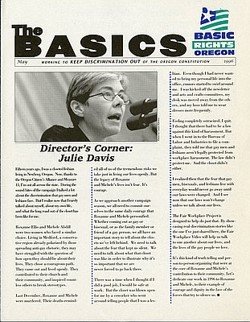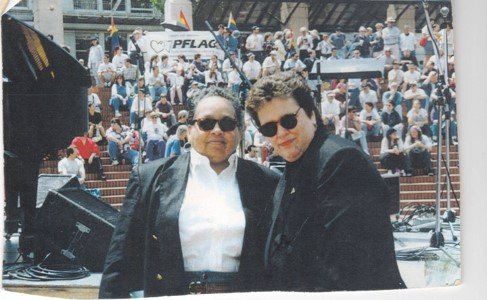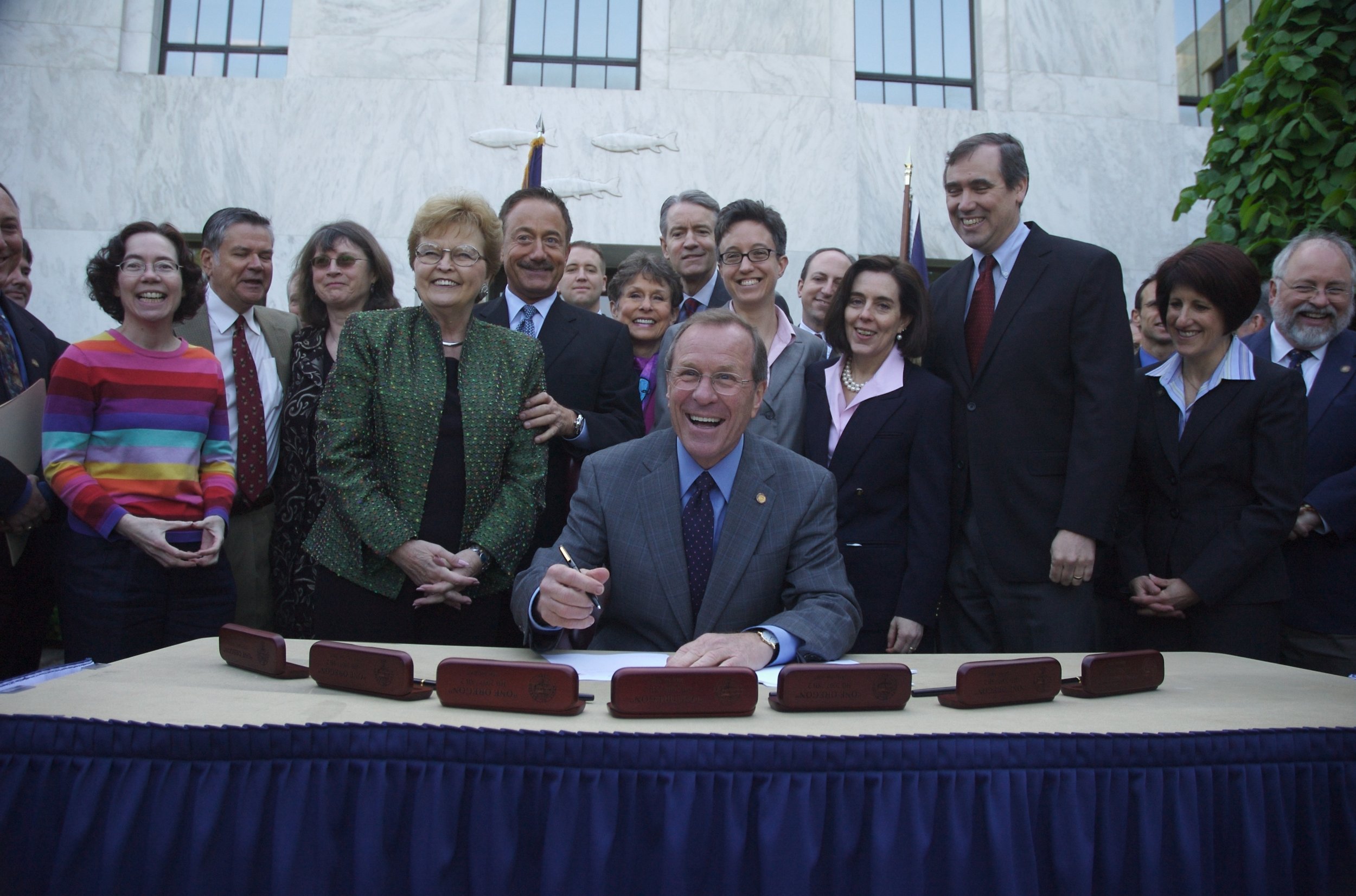
Our History
Basic Rights Oregon, a 501(c)(4) organization, was formed in 1996 out of community responses to anti-gay ballot measures that had plagued Oregon for more than 20 years. In order to sustain and strengthen Oregon’s LGBTQ rights movement between and beyond measure campaigns Basic Rights Education Fund (BREF), a 501(c)(3) organization, was formed in 1999. In fulfilling its mission to build power for lesbian, gay, bisexual, transgender, and queer Oregonians, the organizations collectively known as Basic Rights Oregon have secured historic victories.
After decades of battling anti-gay ballot measures, in 2015 Oregon was rated the second most LGBTQ friendly state in the country by the Movement Advancement Project. Together, we’ve made Oregon one of the best places to live and work in the country by passing landmark legislation and changing policies.
Basic Rights Oregon Timeline
Basic Rights Oregon’s first newsletter
1988 -
Measure 8 passes by a 53 percent vote and repeals an executive order from Governor Goldschmidt that bans discrimination in state agencies based on sexual orientation. Discrimination is legal once again.
1992 -
Measure 9 narrowly fails to add homophobic language to Oregon’s constitution. The measure is put on the ballot by the Oregon Citizen’s Alliance (OCA), which goes on to launch “mini 9” campaigns in cities and counties across the state, winning dozens of local ordinances. All are eventually overturned.
1994 -
Measure 13, another OCA amendment, includes many of the tenants of Measure 9, plus an emphasis on students and restrictions on library access to “homosexual materials”. 51.5 percent of voters reject the measure. OCA attempts to put the measure on the ballot again in 1996, 2000, and 2002. LGBT community leaders recognize that OCA attacks won’t end any time soon, and begin planning to create Basic Rights Oregon to sustain the LGBT rights movement between and beyond ballot measure attacks.
1996 -
Basic Rights Oregon is formed and launches its first strategic plan. The agenda spans 1996-2004 and focuses on stabilizing resources, defending against ongoing attacks, and laying the foundation for proactive wins.
1998 -
Tanner v. OHSU establishes relationship rights in Oregon. Filed in 1993, the ACLU of Oregon assembled this case which marked the beginning of the legal conversation on the rights and recognition of same-sex couples in Oregon. Tanner was the first case at the national level to decide that the government is constitutionally required to recognize domestic partnerships.
1999 -
Basic Rights launches the Fair Workplace Project to increase the number of employers who pledge to adopt nondiscrimination policies in the workplace. Over the next eight years, hundreds of employers across the state sign on, leading to the passage of the 2007 Oregon Equality Act.
Basic Rights spearheads the lobbying effort to defeat a proposed “Defense of Marriage” amendment to the Oregon constitution with the help and support of the ACLU.
A group of volunteer lawyers begins to meet with Basic Rights Oregon to develop legal strategies to achieve relationship rights and marriage based on the Tanner decision. They become the Basic Rights Oregon legal group.
Opposition proposes a ban on trans-inclusive health care coverage in Oregon Health Plan. Basic Rights works with three Republican legislators to successfully kill this bill in committee.
Ashland becomes first city in state to enact a domestic partnership registry. Portland and Eugene follow in 2000 and 2003, respectively.
2000 -
The second Measure 9 narrowly fails – again.
Basic Rights Oregon adds gender identity to its mission statement, and the trans advocacy group forms.
2003 -
After Loni Kai Okaruru, a transgender woman of color, is murdered in Washington County, Basic Rights Oregon introduces legislation to add gender identity to state hate crimes law. Speaker Karen Minnis kills the bill in committee.
2004 -
From February 12 to March 11, San Francisco allows same-sex marriages. One week later the Oregon Defense of Marriage Coalition files a Marriage Ban in Oregon. On March 3, 2004, Multnomah County determines the state marriage statute unconstitutional. Benton County temporarily stops issuing marriage licenses to anyone gay or straight until the legal issues can be determined.
The ACLU sues the state of Oregon on behalf of nine same-sex couples and Basic Rights Oregon.
Measure 36 passes and Oregon’s constitution is amended. Same-sex marriages are voided.
2005 -
Recognizing the deep need for ongoing non-discrimination organizing, Basic Rights hires its first Organizing Director, and begins recruiting field organizers.
BRO volunteer leaders in Washington County win a local ordinance banning discrimination against LGBTQ residents in housing, employment, and public accommodations.
LGBT people of color working group forms, and Basic Rights staff undergo a series of day-long trainings on racial justice.
2006 -
Basic Rights Oregon helps win Parman v. Oregon on behalf of a lesbian couple with children.
Basic Rights Oregon wins 34 of 37 endorsed pro-equality candidate races.
2007 -
The Oregon Equality Act, comprehensive non-discrimination bill, and the Oregon Family Fairness Act, statewide domestic partnership laws, both pass. Basic Rights Oregon leads the lobbying effort with the largest LGBT lobby day in Oregon’s history.
The Oregon Family Fairness Act is delayed; opponents file suit to stop Oregon from enacting domestic partnerships. While the suit makes its way through the courts, the opposition issues restraining order to prohibit implementation of domestic partnerships. Basic Rights Oregon organizes a 2000+ person rally in favor of domestic partnerships. Ultimately, domestic partnerships go into effect on February 2, 2008.
2008 -
Local anti-immigrant activists file two ballot measures in Columbia County. Local activists use Columbia County as a testing ground, planning to take this work statewide if they succeed. Causa, Basic Rights Oregon, and Rural Organizing Project mobilize to defeat these racist measures, and succeed.
2009 -
Safe Schools for ALL Youth Coalition expands Oregon’s anti-bullying law. Basic Rights Oregon leads the effort with the Safe Schools Coalition to update and improve the state anti-bullying law.
Launch of Standing Together (now Our Families) & Trans Justice Working Group volunteer teams.
2010 -
Basic Rights endorses M66 & M67, Oregon’s first tax increases to pass at the ballot. The measures increase taxes on the wealthiest Oregonians.
After two years of campaigning, the Trans Justice Working Group and BRO staff organize for the City of Portland to remove trans-specific exclusions from its employee plans.
2011 -
Our Families releases its first statement of support on National Coming Out Day, with over 40 straight leaders of color signing on. That same day, the first Our Families videos are released and used in media nationwide.
2012 -
Facing Race, Oregon’s first racial equity report card, is released. For the first time, Oregon legislators are graded on their votes impacting communities of color. Western States Center convenes a steering committee for the project, of which Basic Rights Oregon is a member.
2013 -
Following years of education and collaboration with Basic Rights Oregon, the state bans many private insurers from excluding medically-necessary health care for transgender Oregonians.
2014 -
Judge McShane overturns Measure 36, and Oregon wins the freedom to marry.
2015 -
Oregon Health Plan Coverage for Gender dysphoria begins.
Oregon reduces barriers for transgender people who need to update their state identification cards, as a result of Basic Rights Oregon education and advocacy efforts.
Oregon bans conversion therapy on minors by licensed professionals. Basic Rights Oregon leads the legislative effort to ban youth conversion therapy.
Basic Rights Oregon adopts a strategic direction for 2015-2020 that centers the voices of LGBTQ people of color, transgender and gender non-conforming Oregonians, LGBTQ youth, and LGBTQ people living in small and rural communities. All LGBTQ Oregonians- regardless of age, identity, or geography – must experience equality.
2017 -
Oregon passes the first standalone statewide transgender justice bill. Basic Rights Oregon lead the legislative efforts.
2019 -
SB 52––known as Adi’s Act––is signed into law, providing model suicide prevention policy for all of Oregon’s school districts as a result of Basic Rights Oregon’s advocacy and legislative efforts.
2021 -
Basic Rights Oregon introduces SB 704, which would ban the use of the LGBTQ Panic Defense, a legal strategy which perpetrators use to defend the use of violence against LGBTQ victims.
Kathleen Saadat and Donna Redwing at a No on 9 rally in 1992
Nirvana benefit concert for gay rights in Portland, OR in 1992
No on 36 campaign kickoff in 2004
Oregon Health Plan transgender healthcare workshop in 2015
Oregon Equality Act signing in 2007
Governor Kate Brown signing Adi’s Act into law
History of Oregon’s Anti-Gay Legislation (compiled by George Nicola)
- 1853 -
Sodomy Law – penalty 15 years.
- 1913 -
Legislature amends sodomy law to cover any act other than missionary position – maximum penalty 15 years.
- 1917 -
Legislature passes new law to sterilize (by castration or ovariotomy) “sexual perverts & moral degenerates.”
- 1923 -
New sterilization law eliminates definition of “sexual perversion” and eliminates need for “perverts” to show reproductive potential in order to be sterilized.
- 1925 -
Sterilization law broadened to require anyone convicted of sodomy to be referred to the Board of Eugenics for possible sterilization.
- 1935 -
In Special Session a new law requires a list of all known “sexual perverts” to be turned over to the Board of Eugenics for possible sterilization, regardless of whether or not a crime has been committed.
- 1953 -
Oregon enacts a “Psychopathic Offender” law: homosexuals are rounded up to be ‘cured’ in mental institutions.
- 1957 -
New law prohibiting anyone convicted of sodomy from being a public school teacher.
- 1965 -
Sterilization laws amended to delete references to “sexual perverts” and “moral degenerates.”
- 1971 -
The 1913 sodomy statute is repealed, but “accosting for deviate purposes” is added to the criminal code (the Oregon appeals court finally strikes this down in 1981).
- 1973 -
Pro-gay HB2930 mental health bill fails by only 2 votes.
- 1975 -
Portland Town Council lobbies for a statewide bill for gay rights – the bill fails.
- 1978 -
Eugene voters repeal a city ordinance that protected gays from discrimination (Measure 51).
- 1988 -
Oregon Citizens’ Alliance (OCA) initiates Ballot Measure 8,which is approved by 53% of the vote. It repeals Governor Goldschmidt’s anti-discrimination executive order. It is finally overthrown by an Oregon court decision in 1992.
- 1991 -
OCA files a petition for a constitutional amendment (Measure 9). The measure would require government and schools to recognize homosexuality as being abnormal, and the measure lumps homosexuality with pedophilia, bestiality, sadism and masochism. The measure eventually fails.
- 1992 -
OCA vows to win Measure 9 issue town by town. These measures became known as “Sons of 9”. Springfield OR passes an OCA sponsored bill prohibiting the city from offering human rights protection to homosexuals. Corvallis rejects a similar measure.
- 1993 -
OCA sponsors anti-gay laws throughout the state, despite a law that bars cities and counties from enforcing “Son of 9” measures. By 1994 there are 20 wins for OCA.
- 1994 -
OCA’s Measure 13 amends the state constitution to prohibit government extending anti-discrimination protections to homosexuals. The measure is voted down.
- 2000 -
OCA has a new measure, also Measure 9, forbidding public schools from doing anything that “encourages” homosexuality. Fails to pass.
- 2004 -
Oregon voters pass Measure 36, by state constitutional amendment, forbidding marriage between same-sex couples. Only Multnomah and Benton Counties come out against the amendment.
- 2005 -
SB1000 –anti-discrimination bill proposed by Sens. Kate Brown, Alan Bates, Frank Morris and Ben Westlund. House Speaker Karen Minnis modifies House Rules of Order to avoid having the bill come to the Floor.







